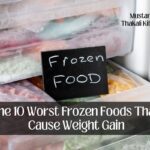A well-balanced diet is necessary for maintaining excellent health. Incorporating nutrient-dense foods into your daily diet can provide the essential vitamins, minerals, and antioxidants to promote health. This article will mention the 15 healthiest foods to eat every day.
Daily Intake Of The 15 Healthiest Foods
Here are the 15 healthiest foods to eat every day.
1. Blueberries: A Burst Of Antioxidants
Blueberries are frequently considered nature’s delicacy. These small berries are loaded with antioxidants that secure our bodies from the damaging effects of free radicals. Also abundant in fiber, vitamin C, and vitamin K. Enjoy a sprinkling of blueberries as a snack or incorporate them into your breakfast cereal for a healthy start to the day.
2. Oats: Whole Grain Goodness
Oats are nutritious whole grains abundant in fiber, protein, and essential vitamins and minerals. They can help reduce cholesterol levels, enhance digestion, and supply sustained energy throughout the day. A nutritious method to start the day is consuming a bowl of oatmeal topped with fruits and nuts.
3. Salmon: A Protein-Packed Fish
Salmon is an outstanding source of high-quality protein and omega-3 fatty acids. These fatty acids are well-known for their heart-healthy properties and may diminish the risk of cardiovascular diseases. Include salmon in your diet a few times weekly to reap its many health benefits.
4. Kale: The Superfood Of Greens
Due to its remarkable nutritional profile, kale is frequently called a “superfood.” It is abundant in vitamins A, C, and K and minerals like calcium and iron. Kale is also high in fiber and antioxidants. Add kale to salads, smoothies, or sauté as a side dish to increase its nutritional value.
5. Greek Yogurt: Probiotics For Gut Health
Greek yogurt is a probiotic-rich, protein-dense, and versatile diet. Probiotics are advantageous microorganisms that promote a healthy gut microbiome. Consuming Greek yogurt regularly can facilitate digestion and promote healthy gut flora.
6. Quinoa: A Complete Plant Protein
Quinoa is a gluten-free, complete protein grain because it contains all nine essential amino acids. In addition, it is rich in iron, fiber, magnesium, and phosphorus. Add quinoa to your diet as a salad base, stir-fry ingredient, or side dish.
7. Avocado: A Source Of Healthful Fat
Avocado is a distinctive fruit abundant in healthy fats, particularly monounsaturated fats. These lipids can help lower bad cholesterol levels and reduce cardiovascular disease risk.
Avocado also provides essential vitamins and minerals, such as vitamin E and potassium. Avocado is the one of the healthiest foods to eat every day.
8. Sweet Potatoes: Rich In Fiber And Vitamins
Sweet potatoes are a tasty and nutrient-rich tuber vegetable. They are a source of dietary fiber, which is beneficial for digestive health. Additionally, sweet potatoes are rich in vitamins A, C, and B6, making them a dietary asset.
9. Almonds: Nutrient-Dense Snack
Almonds are a nutrient-dense snack rich in healthful fats, protein, fiber, and essential minerals. They are also abundant in antioxidants and vitamin E, contributing to skin health and protecting from oxidative stress.
10. Spinach: A Nutritional Powerhouse
Spinach is a verdant green vegetable that provides a multitude of nutrients. It is rich in iron, vitamins A, C, K, and folate. Including spinach in your diet can support healthy vision, strengthen bones, and enhance your immune system.
11. Chia Seeds: Tiny Seeds With Massive Benefits
Chia seeds are tiny grains that are nutrient-dense. They are abundant in omega-3 fatty acids, fiber, and antioxidants. Chia seeds can be added to yogurt, smoothies or substituted for eggs in baked goods.
12. Green Tea: Antioxidant-Rich Beverage
Green Tea is a ubiquitous beverage well-known for its many health benefits. It is abundant in antioxidants called catechins, which have been linked to a lower risk of chronic diseases. Sip a cup of green tea daily to obtain its antioxidant benefits.
13. Lentils: Plant-Based Protein And Fiber
Lentils are legumes abundant in plant-based protein, dietary fiber, and vitamins and minerals. They are a healthy source of folic acid, iron, and potassium. Include lentils in your diet to support heart health and increase satiety.
14. Dark Chocolate: A Delight With Healthful Benefits
Moderate consumption of dark chocolate can have positive health effects. It is high in antioxidants and flavonoids, linked to better cardiac health. Opt for dark chocolate with a high cocoa content for maximum benefits.
15. Broccoli: Packed With Vitamins And Minerals
Broccoli is an exceptionally nutritious cruciferous vegetable. It is with vitamin C, vitamin K, folate, and minerals such as potassium and calcium.
Broccoli contains compounds associated with reduced inflammation and enhanced digestion.
Conclusion
Incorporating these 15 healthiest ingredients into one’s daily diet can significantly improve one’s health. These foods contain essential nutrients, antioxidants, and health-promoting compounds that promote health. Remember to consume a variegated and well-balanced diet to ensure you receive various nutrients.
Thanks for visiting our site.
FAQs
Q1. Is it essential to ingest the 15 healthiest foods daily?
A. Although consuming all 15 of the healthiest foods daily is not required, incorporating a variety of these foods into your diet can provide a variety of nutrients and health benefits.
Q2. Can I replace the recommended dishes with others?
A. Yes, you may substitute other nutrient-rich foods for those that are recommended. The key is consuming a balanced diet that satisfies your nutritional requirements.
Q3. Can vegetarians and vegans consume these foods?
A. A significant portion of the recommended foods are appropriate for vegetarians and vegans. Options like quinoa, lentils, and dark chocolate are excellent plant-based sources of essential nutrients.
Q4. How can these nutrients be incorporated into my daily diet?
A. You can incorporate these foods in various methods, such as adding blueberries to your breakfast cereal, having a salmon salad for lunch, or including kale in your smoothies or stir-fries.
Q5. Before making dietary adjustments, should I consult a healthcare professional?
A. If you have particular dietary concerns or health conditions, it’s advisable to consult a healthcare professional or registered dietitian before making significant dietary changes.
Read more:




